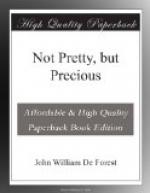difference if we loved, and will call me selfish.
Not so, not so! She might have married as soon
as it pleased her, and I should have been glad.
It would have made a difference, of course: she
must in some sort have been parted from me, but that
I could have borne if it made her happy. But from
her acceptance of her lover—about whom
we will say nothing, save that he was the sort of
man she had always held in abhorrence—she
has coolly ignored my right to any part or lot in
her fate. She had told me (or I, poor fool! thought
so) every hope and fear of her life: now she
told me what she chose, and was astonished that I
expected more—hurt that I seemed changed
and did not find my friendship flourish on crumbs
after being nourished for years from full loaves—was
quite unhappy that I cared so little for the minor
concerns of her life, when, good lack! I did not
know what I might or might not ask and not be snubbed;
for once she told me there were things due to the
man one is going to marry (at that time she had not
got to the extent of saying whom one loves) that could
not be spoken of to me. Of course she had only
to mention the fact to me to make it perfectly plain,
and henceforth he and his doings, his belongings and
himself, all of them of the tamest sort at best, were
a sealed book to me. And again she quenched a
feeble effort of mine to get back to my old place,
by telling me such topics she could discuss only with
her sister, “her shadow sister” she prettily
called her. So I am desolate!
Knowing this, you may understand in some degree what
could induce a little waif like me to accept such
an offer as yours. I think no one in all God’s
earth is more desolate than I. In my heart I bear always
that unforgotten love in my life. I have only
a barren waste to show. It is as if I had started
from a lovely, radiant garden in the fair morning of
my life, in which I had left the bright, sweet rose
of my love, and walking along a narrow, dark path,
had clasped hands with, and drawn my light and warmth
from, a figure walking close beside me; and though
from all sides as I walked forms had come to me, offering
me fair fruits and sweet flowers, I declined them
all without ever a word of thanks, being so content
with my one companion. And suddenly, when all
my youth, all my prospects of other things, had gone,
this idealized one had withdrawn its hand-clasp, and
turning on me a face I did not know, faded into darkness,
leaving me nothing but my broken hopes, a wreath of
withered flowers,
“Tangled down in chains about my
feet.”
You do not of course realize how the old French emigre
blood in my veins, inherited from my father, makes
this a very vital matter to me. We cling to our
hopes very tenaciously while they abide—then
we are distraught. We loved, my father and I,
very few, but those with a clinging oneness that is
wellnigh pain: he loved my mother and myself—that
was all. Likewise I had my two: they having




